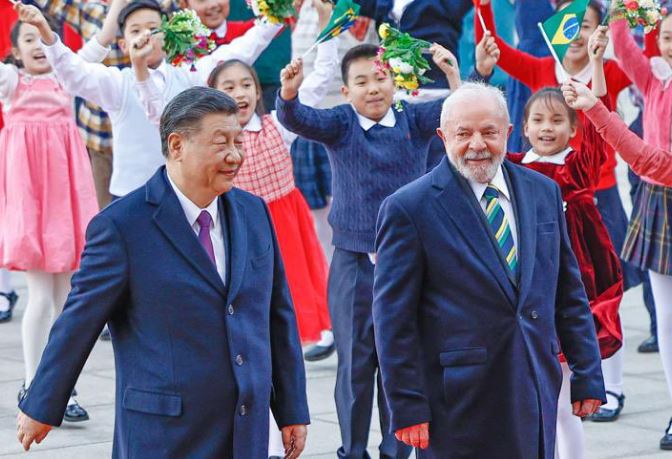Beijing: Chinese leader Xi Jinping met with visiting Brazilian President Luiz Inacio Lula da Silva Friday as part of a push to boost bilateral ties between two of the world’s largest developing nations.
The meeting came on the second day of Lula’s visit to China, his country’s most important trading partner and key ally in his bid to challenge Western-dominated economic institutions.
Lula was greeted with full military honours, including a 21-gun salute, at the Great Hall of the People adjacent to Tiananmen Square in the heart of the Chinese capital.
Their talks focused largely on trade ties and other forms of cooperation, but also touched on the conflict in Ukraine, with the leaders agreeing on the need for a negotiated settlement, according to Chinese state broadcaster CCTV.
“As comprehensive strategic partners, China and Brazil share extensive common interests,” Xi said, according to the Chinese Foreign Ministry.
“China … Sees the relationship as a high priority on its diplomatic agenda,” he said.
The leaders then oversaw the signing of agreements in areas ranging from agriculture to aeronautics. That underscored the improvement in relations since Lula took over in January from right-wing populist Jair Bolsonaro, who showed little interest in foreign travel and under whom relations with China were often tense.
Lula’s visit included the swearing Thursday of former Brazilian President Dilma Rousseff as head of the Chinese-backed New Development Bank, which is funding infrastructure projects in Brazil and elsewhere in the developing world.
The bank portrays itself as an alternative to the International Monetary Fund and World Bank, which often impose loan conditions that developing nations criticise as punitive. It was established as part of a larger framework of cooperation between countries known as BRICS — Brazil, Russia, India, China and South Africa — and has approved 99 loan projects totaling more than $34 billion, mainly for infrastructure projects, according to China’s Foreign Ministry.
Rousseff is Lula’s former chief of staff and succeeded him as Brazil’s first female president. In remarks at the swearing-in ceremony at the bank’s Shanghai headquarters, Lula took swipes at both the IMF and the dominance of the US Dollar in international trade, hailing an agreement between Brazil and China to use the Chinese yuan in their bilateral commerce.
“The New Development Bank is the product of a partnership among BRICS countries with a view to creating a world with less poverty, less inequality and more sustainability,” Lula said, according to an NDB statement.
China is Brazil’s biggest export market, each year buying tens of billions of dollars of soybeans, beef, iron ore, poultry, pulp, sugar cane, cotton and crude oil. Brazil is the biggest recipient of Chinese investment in Latin America, according to Chinese state media, although Lula has spoken against outright Chinese ownership of Brazilian companies.
Lula’s China visit follows trips to Argentina and Uruguay in January and to the US. In February, signaling the importance he places on international affairs in contrast to Bolsonaro.
A key piece of Lula’s outreach abroad is his proposal that Brazil and other developing countries, including China, mediate peace in Ukraine. However, his suggestion that Ukraine cede Crimea as a means to forge peace has angered Kyiv and its closest backers.
China has also sought to play a role in ending the conflict, though in a manner highly supportive of Moscow. It has refused to condemn the invasion, criticized economic sanctions on Russia and accused the US and NATO of provoking the conflict.
Russia and China declared a “no limits” relationship in a 2022 joint statement and Xi reaffirmed the closeness of ties in March by meeting with President Vladimir Putin in Moscow.
Also Friday, Chinese Foreign Minister Qin Gang said China would not sell weapons to either side in the Ukraine conflict, while the Defense Ministry said Minister Li Shangfu would visit Moscow next week for talks with his Russian counterpart.
AP
